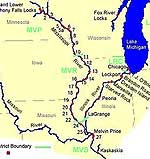By Mary Losure
Minnesota Public Radio
March 19, 2002
|
| RealAudio |
The U.S. Army Corps of Engineers holds public meetings in Minneapolis and LaCrosse this week, to present the latest version of its study of the proposed $1 billion expansion of the upper Mississippi River's lock and dam system. The agency was forced to revise the study two years ago under a storm of criticism. Now, Corps officials say they're taking a whole new approach - but environmentalists doubt it.
| |
|
|
|
||
Barge interests, grain companies, farm groups, and the Army Corps of Engineers have been pushing to expand the upper Mississippi lock and dam system for decades.
Federal law requires the benefits of Corps' projects to outweigh their costs. Since 1993, the Corps has spent $60 million, weighing the costs and benefits of the proposed lock expansion.
But the Corps' study hit the rocks two years ago. That's when the economist hired by the Corps to lead it charged that top Corps officials had manipulated figures in favor of the huge construction project.
An investigation by the Army Inspector General's office supported the whistleblower's charges. The National Academy of Sciences was asked to examine the Corps study, and found serious flaws. Now, Corps of Engineers spokeswoman Justine Barati says the agency has restructured its study.
"Originally, we were just instructed to provide suggestions for possible improvements to the navigation structures. So now we're going to look at both the environment and the navigation structures," Barati says.
The National Academy of Sciences report urged the Corps to consider easing barge congestion by using relatively simple measures, such as barge scheduling and better equipment for coupling and uncoupling barges - alternatives that would be much less costly and less environmentally damaging than the lock expansions.
The report also criticized the Corps study for giving insufficient consideration to environmental concerns.
| |
|
|
|
||
Denny Lundberg, the Corps regional project manager on the upper Mississippi, says the agency is taking a new, much more collaborative approach.
He says it's listening to the full range of interest groups on the river, including environmentalists.
"This is a big river system, important to a lot of people, and there's a lot of different interests on both sides. We're trying to go at it and do the right thing," Lundberg says.
But environmental groups are skeptical.
"The Corps was saying - when it was doing the old plan - that it was taking environmental concerns into consideration. And now it says its taking environmental concerns into consideration?" says Dean Rebuffoni, who works on the Sierra Club's Mississippi River protection program.
"The fact is: they got caught lying, they got caught cheating, and there's pressure in Congress, and that's why they're at least giving lip service to environmental concerns. I hope they're serious," says Rebuffoni.
In its new study, the Corps plans to consider a wide range of scenarios for future barge traffic, along with various alternatives for easing congestion.
They will range all the way from no construction to the full lock expansion project. The agency will submit an interim report to Congress this summer, but will not make a recommendation. Environmental groups suspect the interim report is simply an attempt to turn the whole matter over to Congress.
Congress passes a water projects bill every other year. Environmentalists worry the lock expansion project may be added to this bill, which would be an end run around the requirement that giant Corps construction projects pass environmental and economic muster.
More from MPRMore Information


